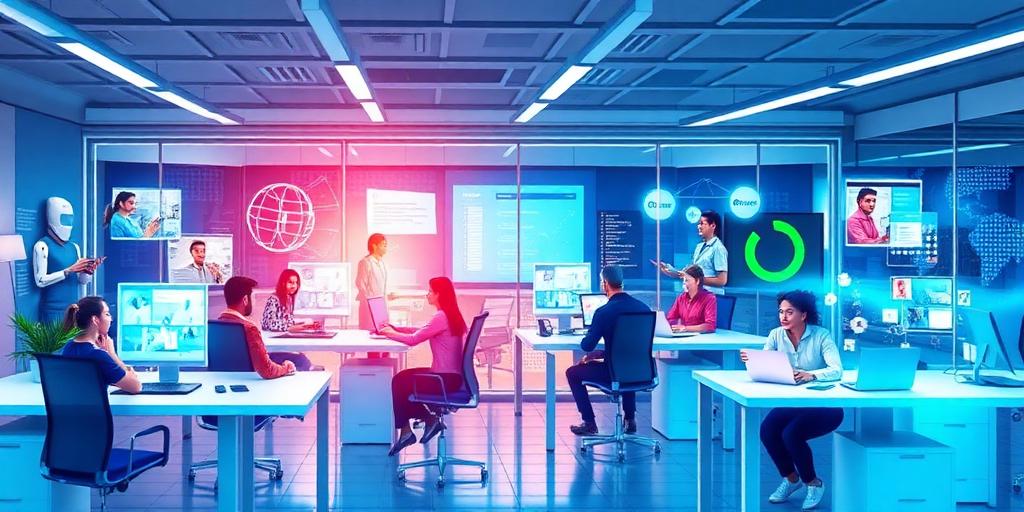The Future of Work: Remote, Hybrid, and AI-Assisted
The way we work is undergoing a profound transformation. The convergence of remote work, hybrid models, and artificial intelligence (AI) is reshaping industries and redefining the traditional office environment. This article explores these key trends and their implications for the future of work.
Remote Work: A New Paradigm
Remote work, once considered a fringe benefit, has become a mainstream practice. Fueled by advancements in technology and accelerated by global events, remote work offers numerous advantages:
- Increased Flexibility: Employees can manage their schedules and work from anywhere.
- Improved Work-Life Balance: Reduced commute times and greater autonomy contribute to better well-being.
- Expanded Talent Pool: Companies can recruit talent from across the globe.
- Cost Savings: Reduced overhead costs associated with office space.
However, remote work also presents challenges:
- Communication Barriers: Maintaining effective communication can be difficult.
- Isolation and Loneliness: Remote workers may experience feelings of isolation.
- Blurred Boundaries: Separating work and personal life can be challenging.
- Cybersecurity Risks: Protecting sensitive data becomes more complex.
Hybrid Models: The Best of Both Worlds?
Hybrid work models combine the benefits of remote and in-office work. These models offer employees the flexibility to work remotely for part of the week while still maintaining a physical presence in the office. Hybrid models can:
- Foster Collaboration: In-person interactions can enhance teamwork and creativity.
- Boost Employee Morale: Combining flexibility with social interaction can improve morale.
- Optimize Office Space: Companies can reduce their office footprint.
- Enhance Company Culture: Regular in-office days can reinforce company culture.
Effective hybrid models require careful planning and execution:
- Clear Communication: Establish clear expectations for remote and in-office work.
- Equitable Policies: Ensure fairness and equal opportunities for all employees.
- Technology Infrastructure: Invest in tools that support seamless collaboration.
- Flexible Workspaces: Design office spaces that accommodate hybrid work styles.
AI-Assisted Work: Augmenting Human Capabilities
Artificial intelligence (AI) is rapidly transforming the workplace. AI-powered tools can automate tasks, enhance decision-making, and improve productivity. Key applications of AI in the workplace include:
- Automation of Repetitive Tasks: AI can handle mundane tasks, freeing up employees for more strategic work.
- Data Analysis and Insights: AI can analyze large datasets to identify trends and patterns.
- Personalized Learning and Development: AI can tailor training programs to individual needs.
- Enhanced Customer Service: AI-powered chatbots can provide instant support.
However, the integration of AI also raises concerns:
- Job Displacement: AI may automate certain jobs, leading to workforce reductions.
- Ethical Considerations: Ensuring fairness and transparency in AI algorithms is crucial.
- Skills Gap: Workers need to develop new skills to work alongside AI.
- Data Privacy: Protecting sensitive data used by AI systems is essential.
Navigating the Future of Work
To successfully navigate the future of work, organizations must:
- Embrace Flexibility: Adapt to evolving employee expectations.
- Invest in Technology: Provide employees with the tools they need to succeed.
- Foster a Culture of Learning: Encourage continuous learning and development.
- Prioritize Employee Well-being: Support employee mental and physical health.
- Address Ethical Concerns: Ensure responsible use of AI and data.
Conclusion
The future of work is dynamic and multifaceted. Remote work, hybrid models, and AI-assisted tools are reshaping the workplace, presenting both opportunities and challenges. By embracing flexibility, investing in technology, and prioritizing employee well-being, organizations can create a future of work that is both productive and fulfilling.
Long-Tail Keywords:
- impact of AI on future jobs
- benefits of remote work for employees
- challenges of implementing hybrid work models
- best practices for managing remote teams









